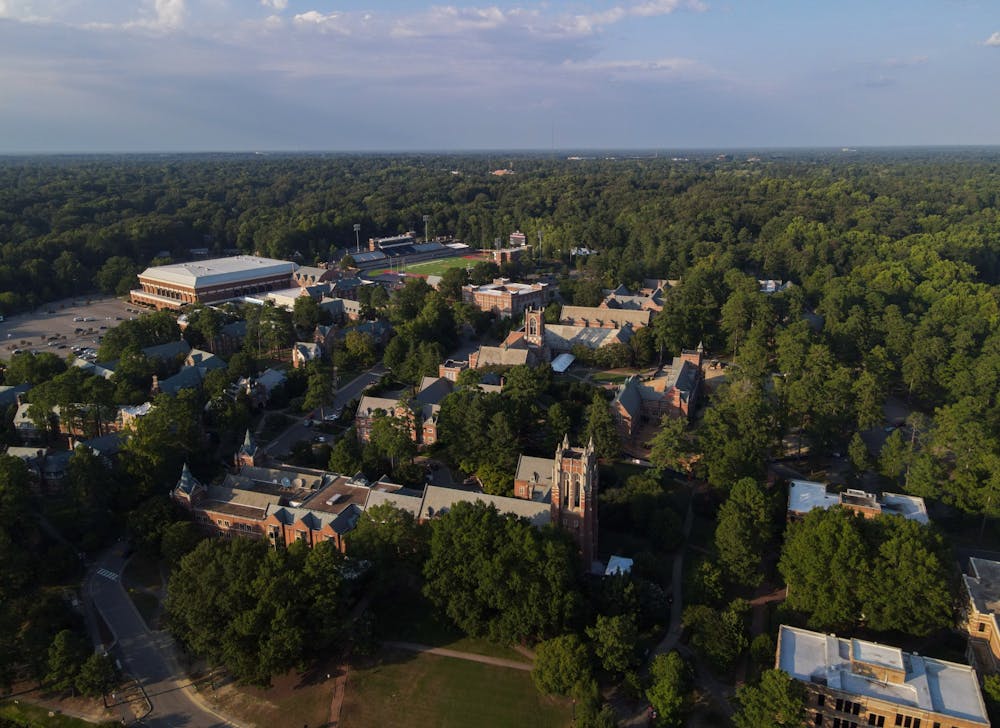UR moved to the Orange Stage of its physical distancing framework Thursday, as a result of consistent decreases in COVID-19 cases on campus and in surrounding areas, according to an email from administrators sent to the UR community Thursday.
In the Orange stage, students have increased access to some on-campus spaces, including non-resident use of residence hall lounges, compared with the more restrictive Red Stage, which UR had transitioned into on March 1. However, the capacity of both indoor and outdoor gatherings has not changed in accordance with the Orange Stage guidelines of UR’s Physical Distancing Framework.
Because of governor Northam’s executive order, approved gatherings remain limited to no more than 10 people indoors and 25 people outdoors, as was the case during Red Stage, according to the Thursday email sent by David Hale, executive vice president and chief operating officer; Jeffrey Legro, executive vice president and provost; and Steve Bisese, vice president for student development.
During all gatherings, both indoor and outdoor, attendees are required to maintain 6 feet of distance from one another. Face coverings are also still required.
UR’s distancing framework states indoor gatherings of up to 25 people and UR-sponsored and approved student organization-hosted outdoor events of up to 100 attendees, plus necessary staff, are permitted, which is not currently the policy being followed, Liz Buehler, assistant director of Events, Conferences and Support Services, wrote in an email to The Collegian.
Buehler emphasized that the move from the Red to Orange stage involves only modest changes to the operations of her office, as the capacity limits for gatherings have not changed.
“Basically, the key differences between the Red and the Orange Stage for students include increased opportunities for visitation to other on-campus residence halls and within residence hall lounges and other common spaces,” Buehler wrote.
The events office will continue to operate in accordance with UR’s current guidelines consistent with Northam's order, she wrote, which will remain in effect until amended or rescinded by a further executive order.
On-campus students are strongly discouraged from leaving campus in Orange Stage, unless for essential reasons, Hale, Legro and Bisese wrote.
“All students should not go to bars or attend parties/large social gatherings,” they wrote. “These behaviors are what has led other institutions to reinstate strict COVID-19 protocols.”
Before the transition to Red Stage, UR had been in an Enhanced Red Stage, which placed added emphasis on limiting student movement, since the start of the spring semester. UR extended the Enhanced Red Stage multiple times following rises in COVID-19 cases at the start of the spring semester.
Although UR-sanctioned off-campus events are not permitted in Orange Stage, the stage shift has given hope to some students that off-campus events might be possible later in the semester, including Glenn Rose, outgoing president of the outdoors club.
Enjoy what you're reading?
Signup for our newsletter
Rose said the club has been unable to hold any of its usual events during the current academic year.
“Usually we have trips that go out every weekend,” Rose said. “We’ll go hiking somewhere in Shenandoah [National Park].”
Rose said the club was now planning outdoor activities on campus, including using the ropes course. The club wants to do a bike tour possibly along the Virginia Capital Trail, which goes from Richmond to Williamsburg, if UR enters the Yellow Stage, which would allow for limited UR-sponsored events off-campus, Rose said.
Hale, Legro and Bisese emphasized in the Thursday email that the stage shift is subject to change.
“While we feel confident we can safely transition to the Orange Stage at this time, we will return to Red, as we have done in the past, if circumstances warrant,” they wrote. “We have recently witnessed this unfortunate necessity on other college campuses not that far from us; therefore, please continue to adhere to our health and safety guidelines.”
University of Maryland, for example, moved classes online and instructed students to stay in their dorms for a week in late February because of a rise in COVID-19 cases within the UMD community. The University of Virginia increased its COVID-19 restrictions in February because of rising case numbers as well.
As of March 17, UR’s COVID-19 Dashboard indicated one positive COVID-19 case on campus. From March 7-13, there were zero active COVID-19 cases on campus, according to the dashboard.
“As we continue the spring semester, future actions related to changes in our operating stage will be guided by the prevalence of the virus on our campus and in our community,” Hale, Legro and Bisese wrote.
Virginia’s seven-day average positivity rate has been decreasing overall since January, but local jurisdictions near UR — including Henrico County and Richmond City — have seen slight increases in their seven-day average positivity rates recently.
UR will continue to conduct bi-weekly mandatory prevalence testing for all undergraduate students taking in-person classes during the Orange Stage, according to the Thursday email.
Contact managing editor Emma Davis at emma.davis@richmond.edu.
Support independent student media
You can make a tax-deductible donation by clicking the button below, which takes you to our secure PayPal account. The page is set up to receive contributions in whatever amount you designate. We look forward to using the money we raise to further our mission of providing honest and accurate information to students, faculty, staff, alumni and others in the general public.
Donate Now



